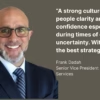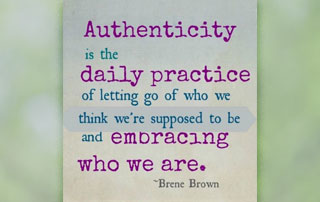Obsessing on your objective or goal – may cause you to forget your mission or purpose.
In the movie The Bridge on the River Kwai , the main character, Colonel Nicholson, is a prisoner of war in Burma who leads his men to build a bridge for his Japanese captors. Nicholson is an officer of high integrity, dedicated to excellence, a great leader of people – and thus well trained to complete any mission that he is given. So he skillfully inspires his men to build a near-perfect bridge. By the film’s end, he finds himself in the painful position of defending the bridge from attack by fellow British officers who want to destroy it – to prevent Japanese trains from using it. There’s a chilling moment of realization, right before the bridge is detonated, when Nicholson (played by Alec Guinness) utters the famous line, “What have I done?” He was so focused on his objective – building the bridge – that he forgot his larger purpose – winning the war!
That is objective/goal obsession, which is a subset of wanting to win too much. It rears its ugly head in many ways. In its broadest form, it’s the force at play when we get so wrapped up in achieving our goal that, like Colonel Nicholson, we do it at the expense of a larger mission or our purpose. It’s one of those paradoxical traits that are usually the sources of our success, but taken too far can become blatant causes of failure. Given their history of success, they end up achieving a result that does more damage than good to their organizations, their families, and themselves.
The canyons of corporate America are littered with victims of goal obsession. I asked one hard-driving executive, “Jack, why do you work all of the time?” He replied, “Why do you think? Do you think I love this place? I am working so hard because I want to make a lot of money!” I continued my inquiry, “Do you really need this much money?” “I do now,” Jack grimaced. “I just got divorced for the third time. With three alimony checks every month, I am almost broke.” “Why do you keep getting divorced?” I asked. The answer came out as a sad sigh. “All three wives kept complaining that I worked all the time. They have no idea how hard it is to make this much money!”
This sort of classic goal obsession would be laughable if the irony — or more accurately, the failure to appreciate the irony — weren’t so painful.
One of the most ironic examples of goal obsession was the “Good Samaritan” research done by Darley and Batson at Princeton in 1973. In this widely referenced study, a group of theology students was told that they were to go across campus to deliver a sermon on the topic of the Good Samaritan. As part of the research, some of these students were told that they were late and needed to hurry up. Along their route across campus, Darley and Batson had hired an actor to play the role of a victim who was coughing and suffering.
Ninety percent of the “late” students in Princeton Theology Seminary ignored the needs of the suffering person in their haste to get across campus. As the study reports, “Indeed, on several occasions, a seminary student going to give his talk on the parable of the Good Samaritan literally stepped over the victim as he hurried on his way!”
What’s happening here? Goal obsession clouded their judgment. They were under time pressure. They were in a hurry. They had deadlines. They were going to do something that they thought was important. Other people were depending on them. It was their single focus for what they believed at the moment defined success or failure.
In that hot-house of circumstances, their goals got warped. After all, when people committed to hitting their targets pick the wrong one — when they focus on the bridge and not the war — somebody may end up getting hurt.
You have to step back, take a breath, and look around. Survey the conditions that are making you obsessed with the wrong goals. Time and deadline pressures come with being a leader. We confront them every minute of every day. They do not go away. Which makes it all the more important to reflect upon our work, match it up against the life we want to live, and consider, “What am I doing?” and “Why am I doing this?” Ask yourself, “Am I achieving a task and forgetting my organization’s mission? Am I making money to support my family — and forgetting the family that I am trying to support?”
After all this effort and display of professional prowess, you don’t want to find yourself asking, “What have I done?” Achieving objectives and accomplishments are critically important to one’s success, but never forget or compromise your purpose.









